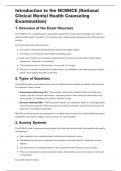Summary
Summary 200 NCMHCE Exam Questions with Answers and Explanations
- Course
- Health information
- Institution
- Health Information
Pass the NCMHCE exam with the best study prep. 200 NCMHCE exam style questions, 20 different case studies with 10 questions each. All with answers and explanations.
[Show more]



